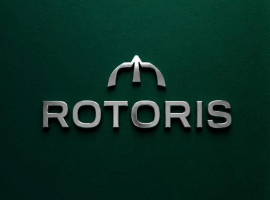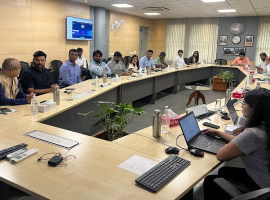Empowering Startups: IN-SPACe’s 10-Year Vision to Turn India into Space Superpower
Three points you will get to know in this article:
- IN-SPACe urged facilitating startup funding, fostering talent pools, and stimulating demand by identifying multiple intervention areas.
- Centered on startups, the decade-long vision accelerates India’s rise as a leading global space power, generating socio-economic benefits.
- According to the agency, India’s space sector is poised to achieve a market size of $44 billion by 2033, representing almost 8% of the global market share.
Focusing on propelling our homegrown spacetech ecosystem forward, the key player, IN-SPACe (Indian National Space Promotion and Authorization Centre), has revealed its ten-year vision and strategy for boosting the Indian space economy.
Central to this plan is the pivotal role that startups play, emphasizing the acceleration of India’s ascent as a leading global space powerhouse. The agency envisions local manufacturing capabilities and infrastructure development as critical components of its decade-long strategy to bolster the space economy.
According to the agency, the overarching goal of the ten-year vision is to establish robust domestic manufacturing capabilities and infrastructure to fortify the space sector. The document advocates for actively promoting and facilitating the involvement of non-governmental entities, particularly startups, in this rapidly expanding sector.
“As we reveal the ten-year outlook for the Indian space economy, we underscore that the destiny of the Indian space domain is a collective journey. Therefore, our approach cultivates an age of partnership among all contributors to expedite progress. Chairman Pawan Goenka of IN-SPACe affirms, ‘ISRO is extending a warmer invitation than ever to private sector involvement. Together, we can effectively propel the space economy, fostering a resilient and self-reliant Aatmnirbhar Bharat.'”
The vision document sets its sights on cultivating a vibrant space ecosystem within our borders. According to the agency, our indigenous space economy currently stands at $8 billion, contributing 2% to the global market share. India is poised favorably to escalate this figure to an estimated $44 billion by 2033, constituting nearly 8% of the global market share.
IN-SPACe is dedicated to materializing this aspiration through the pursuit of eight strategic goals—six strategic and four enabling capabilities. These encompass a broad spectrum, from advancing satellite communication to facilitating funding for domestic startups.
One noteworthy feature of the vision document lies in its aspiration to create a local demand and facilitate entry into global markets for space products proudly crafted in India. The agency is unabashedly committed to advocating for ‘co-development and co-production’ as a means to expedite the growth of space products within the private sector. IN-SPACe passionately advocates for nurturing private sector capabilities, envisioning the space agency not only as a mentor but also as an enabler and a valued customer in this collaborative journey.
Push For SatCom
The vision document urges the government to evaluate the country’s mid and long-term need for satellite communication. As part of this initiative, it advocates for the implementation of a forward-looking plan to support the necessary throughput capacity and the maintenance of space assets for broadcasting.
Furthermore, the document emphasizes the importance of authorities ensuring provisions are in place to meet future satcom demands from both Indian and international stakeholders.
In a people-friendly tone, the vision document suggests, “Connect remote areas by strategically deploying high-throughput satellites (HTS) and promoting the adoption of satellite broadband services through existing global LEO/MEO constellations.”
On the very same day, reports surfaced that the e-commerce behemoth Amazon has joined the satellite communication competition in India, as it pursues a satcom license from IN-SPACe. Amazon’s satellite arm, Project Kuiper, is reportedly gearing up to discreetly apply for a global mobile personal communication by satellite services (GMPCS) license to kickstart its operations.
While IN-SPACe extends a warm welcome to both global and local players in the satcom arena, the Indian spacetech landscape is experiencing robust growth, propelled by its resourceful approach and a strong focus on cutting-edge technology.
Over the span of 2014 to 2023, funding exceeding $285 million has been successfully secured by over 150 spacetech startups in India. Considering the anticipated growth of the global space market to a whopping $1 trillion by 2030, Indian startups are in a prime position to seize opportunities, meet the rising demand, and contribute on a global scale, crafting innovations right here in India.
IN-SPACe, the key player in India’s space sector, has unveiled its ten-year vision to boost the Indian space economy. Startups will play a crucial role in this plan, as the agency aims to establish domestic manufacturing capabilities and infrastructure. With aspirations to increase India’s space economy from $8 billion to $44 billion by 2033, IN-SPACe emphasizes collaboration and partnership with private entities. The vision document also highlights the need for satellite communication development and mentions Amazon’s interest in obtaining a satcom license in India. Overall, Indian startups are well-positioned to contribute to the global space market’s anticipated growth.
- Taasha Craft on Shark Tank India Season 5 Episode 23: Handcrafted Jewellery Wins the Sharks’ Confidence - February 5, 2026
- From Bankruptcy to a Streetwear Empire: Bonkers Corner’s Journey in Shark Tank India Season 5 - January 30, 2026
- Built on Instagram, this live commerce venture impressed the judges—but the founders still walked away without a deal. Here’s why - January 19, 2026




